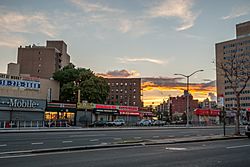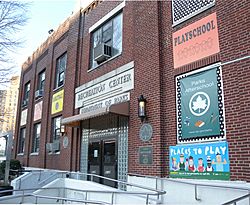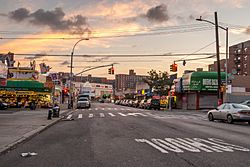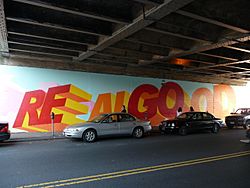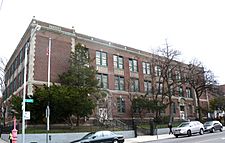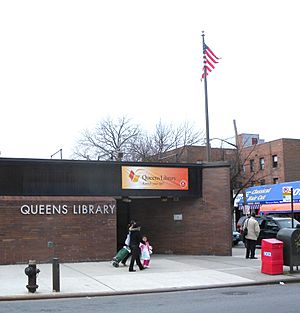Rego Park facts for kids
Quick facts for kids
Rego Park
|
|
|---|---|
|
Neighborhood of Queens
|
|
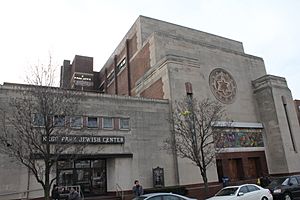
|
|
| Nickname(s):
Bukharlem/Buharlem, Real Good Park
|
|
| Country | |
| State | |
| City | |
| County/Borough | |
| Community District | Queens 6 |
| Settled | 1653 |
| Developed | 1920s |
| Founded by | English and Dutch settlers |
| Named for | The Real Good Construction Company |
| Area | |
| • Total | 5.04 km2 (1.945 sq mi) |
| Elevation | 27.8 m (91.3 ft) |
| Population
(2010)
|
|
| • Total | 28,260 |
| Ethnicity | |
| • White | 46.2% |
| • Asian | 31.7% |
| • Hispanic | 16.6% |
| • Other/Multiracial | 3.0% |
| • Black | 2.5% |
| Time zone | UTC−5 (EST) |
| • Summer (DST) | UTC−4 (EDT) |
| ZIP Code |
11374
|
| Area codes | 718, 347, 929, and 917 |
Rego Park is a busy neighborhood in the borough of Queens in New York City. It's known for its many apartment buildings and houses. You'll also find a large shopping area and a big Jewish community here.
Rego Park is surrounded by other neighborhoods. To the north are Elmhurst and Corona. To the east and south is Forest Hills. And to the west, you'll find Middle Village. Key roads like Queens Boulevard and the Long Island Expressway help define its borders.
The neighborhood is part of Queens Community District 6. Its main ZIP Code is 11374. The local police department, the New York City Police Department's 112th Precinct, keeps the area safe.
Contents
Discovering Rego Park
A Look Back: Rego Park's History
Rego Park was first home to Native American people called the Leni Lenape. Later, in 1653, English and Dutch farmers settled here. They started a community called Whitepot. This name might have come from a Dutch word meaning "hollow creek."
The Remsen family, early settlers, created a burial ground that you can still find today. The colonists also built the Whitepot School, which taught children until the late 1800s.
From Farmland to Neighborhood
The land was great for farming. Farmers grew things like hay, corn, and vegetables. They sold their crops in Manhattan. By the late 1800s, Chinese farmers also moved in and sold their produce to Chinatown.
The area got its current name, Rego Park, in 1925. This happened when the Real Good Construction Company started building many homes here. "Rego" comes from the first two letters of "Real Good." The company built 525 houses, each with eight rooms. Stores opened in 1926, and apartment buildings followed in 1927–1928.
In the 1930s, the Independent Subway System built subway stations in the area. This helped more people move to Rego Park.
The "Rego Park Inferno"
In February 1972, a big fire happened on 63rd Drive. It started in a shoe store and quickly spread to other shops, including a toy store and a pet shop. The fire also reached the neighborhood library, which was badly damaged.
After the fire, a mobile library called a "Bookmobile" served the community. A new library was later built in a different spot. A similar fire had also damaged the same block in 1959.
Who Lives in Rego Park?
In 2010, about 28,260 people lived in Rego Park. The neighborhood is very diverse! About 46% of residents are White, 31% are Asian, and 16% are Hispanic or Latino. There are also smaller groups of African American and other backgrounds.
Most people living in Rego Park and nearby Forest Hills are adults. About 31% are between 25 and 44 years old, and 28% are between 45 and 64. The average life expectancy here is 85.4 years, which is higher than the average for New York City.
A Diverse Community
Rego Park has a large Jewish population, many of whom have roots in Georgia or Russia. You can find many synagogues and kosher restaurants here. After 1945, many Holocaust survivors made Rego Park their home.
In the 1990s, more Jewish immigrants from former Soviet Union countries, especially from Central Asia, moved to the area. Many of these are Bukharan Jewish people. This has given Rego Park a "Russian feel," with many signs written in Russian Cyrillic. You can also find delicious Uzbek and Tajik cuisine in local restaurants.
People from many other countries also live here, including Albania, Bosnia, Israel, Romania, Iran, Colombia, South Asia, China, Bulgaria, Peru, and South Korea. This mix of cultures makes Rego Park a vibrant place!
Homes and Shops in Rego Park
Where People Live
Rego Park has many different types of homes. You'll see apartment buildings like The Carol House and Savoy Gardens.
In the southern part of Rego Park, many houses are built in older styles, like colonial, English, and Tudor. These often have unique slate roofs. There are also two-family homes and detached houses. An area called the Crescents is known for its curved streets and many Tudor-style homes with large lawns.
You might also see newer "Fedders houses." These are often similar-looking homes, sometimes with Fedders brand air conditioners sticking out. Recently, a new 312-unit apartment tower was built to welcome more young professionals to the area.
Shopping Fun
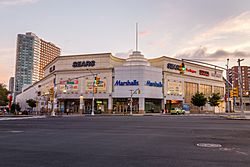
Rego Park is a great place to shop! The Rego Center is a huge, four-floor shopping mall. It has many big stores and a large parking garage. A second part of Rego Center opened in 2010 with even more shops. It even had a small IKEA store for a while.
Just across the Long Island Expressway is the Queens Center Mall. This mall opened in 1973 and doubled in size between 2002 and 2004. The first Trader Joe's grocery store in Queens opened in Rego Park in 2007.
The main shopping street in Rego Park is 63rd Drive. It's filled with many small stores, bakeries, pharmacies, and restaurants. You can also find many shops along 108th Street.
Famous Places in Rego Park
- Lost Battalion Hall: This building on Queens Boulevard is named after a group of soldiers from World War I. Today, it's a community center run by the New York City Department of Parks and Recreation. It also has a play area.
- The Drake Theater: This movie theater opened in 1935 and closed in the 1990s. It was even used in the 1997 movie Private Parts.
- AT&T Building: An AT&T telephone building stands at Queens Boulevard and 62nd Drive.
- Our Saviour Lutheran Church: This church has been open since the 1920s and holds services in both English and Chinese.
- Rego Park Jewish Center: This beautiful art deco building opened in 1939. It has special carvings on its outside walls that show scenes and symbols from the Old Testament. It's listed on both the New York State and National Register of Historic Places.
- Trylon Theater: Another art deco theater, built around the time of the 1939 New York World's Fair. It was later used as a center for Russian Jewish education and then a synagogue.
Important Roads in Rego Park
- 63rd Road and Drive: This is a main street for businesses in Rego Park. It used to be called Remsen's Lane, named after a family who lived there.
- The Crescents: These streets are shaped like semicircles. Their names, like Asquith and Cromwell, were chosen when the Real Good Construction Company built the area in the 1920s.
- Horace Harding Expressway: This road was once a turnpike called Nassau Boulevard. It was renamed after Horace J. Harding, a businessman who supported building parkways in New York.
- Queens Boulevard: This is a very wide road that goes through Rego Park. It was once two small dirt roads. In the 1910s, it was paved and made much wider. It's a very busy road.
- Woodhaven Boulevard: This road was once called Trotting Course Lane because horses used to travel on it. It's a very old road that dates back to colonial times.
- Yellowstone Boulevard: This road is named after the area's original name, Whitepot.
Community Spirit
The Rego Park Group works to make the neighborhood a better place to live. The Rego Park Green Alliance helps by planting flowers and trees. They also helped get new garbage cans and fix sidewalks. They even created a large mural under the Long Island Rail Road overpass on 63rd Drive that celebrates the neighborhood.
In 2010, a kosher soup kitchen opened on Queens Boulevard. It serves free meals to adults, seniors, and families in need.
There are also ideas for what to do with an old, unused train line called the Rockaway Beach Branch. Some people want to turn it into a park called The Queensway. Others want to use it again for subway or train service.
Safety in Rego Park
Rego Park doesn't have its own fire stations. However, there are two New York City Fire Department (FDNY) stations nearby in Forest Hills and Middle Village that serve the area.
Mail and ZIP Code
Rego Park uses the ZIP Code 11374. The United States Post Office has a branch called the Rego Park Station on Queens Boulevard.
Learning in Rego Park
Rego Park and Forest Hills have many residents who have gone to college. About 62% of people here have a college degree or higher. This is more than the average for Queens and New York City.
Kids in elementary school in Rego Park and Forest Hills also tend to miss fewer school days than the city average. And most high school students (91%) graduate on time, which is also higher than the city average.
Public Schools
Public schools in Rego Park are run by the New York City Department of Education. Here are some of the elementary schools:
- P.S. 139 (Rego Park School)
- P.S. 174 (William Sidney Mount School)
- P.S. 175 (the Lynn Gross Discovery School)
- P.S. 206 (the Horace Harding School)
- P.S. 220 (Edward Mandel School)
For middle school, students usually go to J.H.S. 157 Stephen A. Halsey in Rego Park or J.H.S. 190 Russell Sage in Forest Hills. High schools in New York City don't have zones; students apply to them. Forest Hills High School is located nearby.
Private Schools
Rego Park also has several private schools:
- Our Lady of the Angelus (PK–8, Catholic school)
- Resurrection-Ascension School (PK–8, Catholic school)
- Our Saviour Lutheran School (K-8)
- The Rego Park Jewish Center and the Jewish Institute of Queens also offer private education.
The Library
The Queens Public Library has a branch in Rego Park at 91-41 63rd Drive. It's a popular spot, with many visitors and books borrowed each year. There are plans to replace the current building with a new, larger one in the coming years.
Getting Around Rego Park
The New York City Subway's IND Queens Boulevard Line has local stations at 63rd Drive and 67th Avenue. These stations are served by the E M R trains trains and run under Queens Boulevard.
Many local buses, like the Q11, Q21, Q29, Q38, Q52 SBS, Q53 SBS, Q59, Q60, Q72, Q88, serve the neighborhood. There are also express buses, such as the QM10, QM11, QM12, QM15, QM18, QM40, QM42, BM5, for longer trips.
The Long Island Rail Road used to have a station in Rego Park, called the Rego Park station. It closed in 1962, and you can't see much of it today.
Famous People From Rego Park
Many interesting people have lived in Rego Park, including:
- Kenny Anderson (born 1970), a former professional basketball player.
- David Baltimore (born 1938), a scientist who won a Nobel Prize.
- Sid Caesar (1922–2014), a famous actor and comedian.
- Vera-Ellen (1921–1981), an actress and dancer.
- Gypsy Rose Lee (1911–1970), a well-known entertainer.
- Robert Lipsyte (born 1938), a sports journalist.
- Tommy Ramone (1949–2014), the drummer for the band The Ramones.
- Art Spiegelman (born 1948), a graphic artist who won a Pulitzer Prize. His book Maus includes scenes set in Rego Park.


